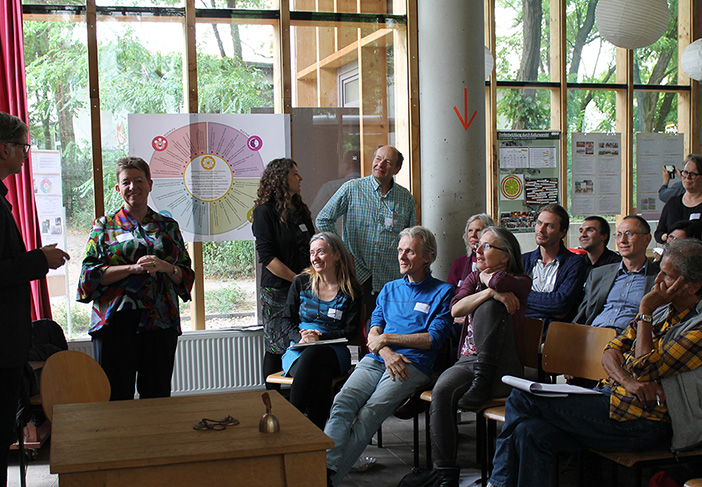
|
»Living in sustainable villages«
Stella Veciana and Christoph Strünke.
The global eco-village network GEN has been supporting sustainable regional and village development for over 20 years. The project attempts to make the methods and educational formats collected from around the world available in partnership-based village cooperations (in Baden-Württemberg, Hesse, Lower Saxony, Thuringia and Saxony-Anhalt). Via an innovative and holistic approach the aim is to inspire and encourage the participating as well as other rural communities to find their own path towards more sustainable futures.
(German) more |
|
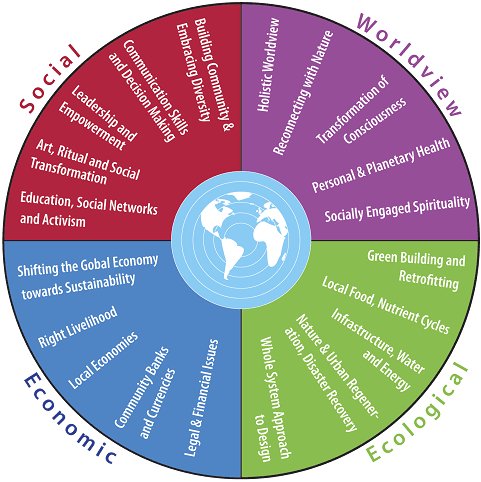
|
»The contribution of intentional communities to sustainable lifestyles and sustainability research.«
Stella Veciana.
More and more sustainability-oriented and self-organized grassroots initiatives and community projects are growing worldwide. Aiming to work for a resilienten social and environmental change, they represent only a niche factor within the global context. The Scientific Advisory Council on Global Change (WBGU) considers these pioneers of change (or "Change Agents") of major strategic relevance for a transformation towards more sustainable lifestyles. But here the question arise how how these isolated niche players on a cross-sectoral level can become a critical mass " to lead into a community feeling of collective self-empowerment and a broad social movement can be achieved". The potential impact of academic and practical cooperation for the transformation to sustainability is enormous and gives through crosslinking organizations such as the Global Ecovillage Network GEN strategic impetus to policy-making, in particular to research policy-making. more |
|

|
»Join a new spirit of community research!«
Stella Veciana and Christoph Strünke.
A new spirit of inquiry and research arouses in the ecovillage Sieben Linden: research to join in! So far, academics used to study the ecovillage for their particular research interests. Now ecovillagers engage, investigate, discover, and try science themselves. Sieben Linden is currently involved in six different research projects in the areas of climate protection, sustainable food, science and responsibility, renewable energies and sustainable construction. But moreover the creation of a new research institute with and for intentional communities in the German-speaking countries is planned.
(German) more
|
|
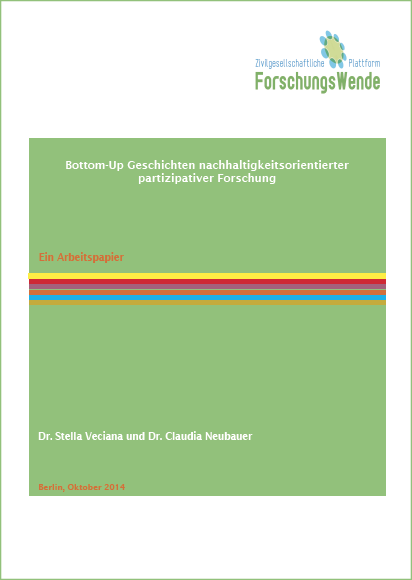
|
»Bottom-Up storytelling about sustainability-oriented participative research.«
Claudia Neubauer and Stella Veciana.
The study "Bottom-up stories of sustainability-oriented science participative research" gives insight into German and European projects driven by the "science with and for society" approach.
The transformations of the science system are subject to an historical development, which, inter alia, emerges from the gap between the academic and the practical knowledge, between the scientific and the citizens knowledge. In order to design and redirect science and research policy towards sustainability more shared spaces are required in which civil society, academia, politics and industry could negotiate relevant decisions together. These shared spaces are to be understood as places of integration (Schneidewind, 2013; Bergmann, 2010) of different forms of knowledge and require an appropiate good governance.
It's not just about the participatory approach of the research, but also about the orientation of the jointly undertaken research itowards sustainable development. Not every participatory research fosters simultaneously nor automatically sustainability and the common good. At the same time the examples presented give evidence of the obstacles experienced by all active co-designer of these shared spaces.
more |
|
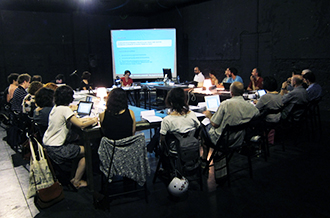
|
»Interdisciplinarity and knowledge transfer in joint art and science research«
Which are the contexts and strategies that facilitate the transfer of knowledge? What methods and evaluation systems already exist for the interdisciplinary knowledge transfer? What kind of economic model and what values are required for collective knowledge generation processes? These questions were discussed at the workshop WIRKT: interdisciplinarity and knowledge transfer, headed by Josep Perelló. The workshop took place in HANGAR (Barcelona) from 9th to 11th of July as part of the EU-funded project SoftControl. The workshop develops further the protocol for Interdisciplinary Research of the Workshop Synergy: Interdisciplinary Practice and Theory, which took place in HANGAR in the summer 2013.
»Transfer of knowledge, cultural policies and instruments to foster transdisciplinary communities«
Tere Badia.
The Visual Art Centre HANGAR aims to create a research community working at the crossroads of art, science, technology and society. In the interview the director of HANGAR, Tere Badia, explains her views what are the conditions to make this possible.
more |
|
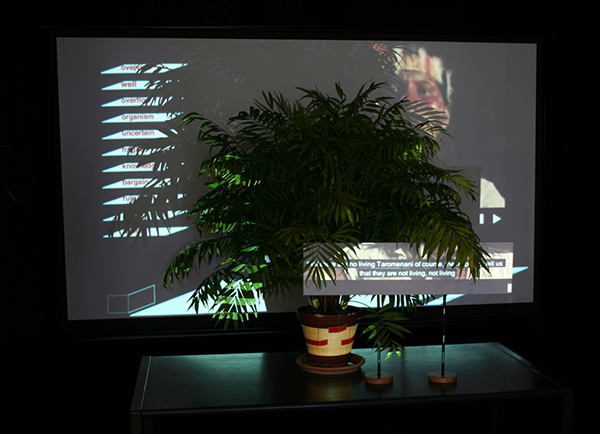
|
»Conferences as Shared Spaces | Spaces for knowledge integration: Challenge YASUNI-ITT«
Stella Veciana.
Conferences are spaces of encounter and exchange of different forms expertise and knowledge. However, usually conferences are more or less closed environments for scientific and expert groups which do not consider a dimension of knowledge integration for instance with local practical knowledge. How could such a shared space be re-designed as a place of integration of different forms of knowledge and as a place for encounter of diversity and complementarity?
(German) more |
|
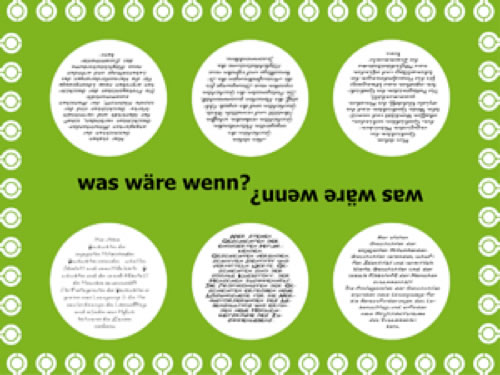
|
»WHY CULTURE MATTERS«.
Steffi Ober.
In order to develop a shared vision of what a sustainable future might look like, the sustainability sciences take advantage of inter- and transdisciplinary research approaches. Their perspective starts from the knowledge that the world is too complex, only if the disciplines of natural sciences and the humanities, politics and civil society cooperate with each other, an action-guiding and "reasonable whole picture" can emerge. This demands a new culture in the established scientific organizations from the German Research Foundation to the Federal Ministry of Education and Research. Transdisciplinary approaches are rarely, if ever, being developed in their corresponding research programs, research results evaluation, nor appropriate project search.
»Plea for a culture of communication and self-reflection in science«
Stella Veciana.
How can a culture of self-reflection be introduced in the established scientific organizations and a mutual culture of communication between science and society be developed?
(German) more |
|

|
»Inter- and Transdisciplinarity: driving synergies in joint art and science research projects«
How can we deal with the challenges of inter- and transdiciplinary research? This was one of the main questions raised at the Workshop Synergy: Interdisciplinary Practice and Theory coordinated by Simon Penny, Roc Parés and Mara Balestrini. The workshop took place at HANGAR in Barcelona from the 28th to 30th of June within the framework of the European funded project Soft Control. In this section a series of articles about interdisciplinarity from the participants of the workshop will be presented.
»What do we mean with interdisciplinarity and why do we care?«
Simon Penny.
Interdisciplinarity is a theme which dances around pedagogy and research, often in vogue, and lauded as a wellspring of innovation. Regrettably, just as often, the term is leveraged in initiatives which employ the term in limited or even counterproductive ways. The first question that must be asked of any such enterprise is why is the term being deployed and to what ends. more
»A physicist, a sociologist and an artist come into a bar... - What is the impact of humor on different types interdisciplinary projects?«
Swen Seebach.
The article describes four different types of interdisciplinarity (hierarchical, symmetrical, collaborative, and individual interdisciplinarity) on the basis of the Workshop Synergythat took place at HANGAR in Barcelona from the 28th to 30th of June within the framework of the European funded project Soft Control. more
»The cultural relevance of interdisciplinarity in the context of an unsustainable technified hyper-consumeristic society«.
Roc Parés.
We live in a time in which cultural practices are systematically expropriated from society by market economies with the consent of public institutions. Art and Science have been kidnapped and are returned to society in the form of commodities gadgets and military machinery. more |
|
|

|
»The Entirely New«.
Miriam Wiesel, Axel Schmidt.
What is the background to the current change of energy regimes in the world? The 23rd ‘Kreuzberger Salon’ was dedicated to the hypothesis of the transition from the geological epoch of the Holocene to that of the Anthropocene. Reference point was the opening of the »Anthropocene project« at the House of World Cultures in Berlin. The ‘Kreuzberger Salon’ was founded by Wiesel and Schmidt in 2010, and in this monthly meeting a spectrum of topics relating to the relationship city >< countryside are discussed. (German) more
»The Human in the Centre: Geologists Speculate About a ‘New Human Made Geological Epoch’, and the House of World Cultures About a New Research Agenda.« Stella Veciana.
Has a new geological epoch begun, and if so, what global consequences are to be expected? Since January 2013, the ethical, aesthetic, political and economic dimensions of the Anthropocene are discussed at the HKW. A reflection on what from this discussion instigated by geology can be brought into our everyday life, and what the theory of the Anthropocene can contribute to a sustainable society. more |
|
|
|

|
»A Research Agenda at the Crossroads between Art, Science, Technology and Society?«
Stella Veciana.
A brief introduction to interdisciplinary agenda pioneer Stephen Wilson’s research agenda for the »Information Arts«, and to the White Paper proposal from the SEAD network, developing a new research agenda to improve the cooperation between science, technology, art and design. more |
|
 
imprint | contact |
|
|